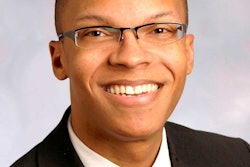Dr. Rochelle Parks-Yancy didn’t always think that she would end up as a university professor.
For a brief moment, she even toyed with the idea of working on Wall Street.
But a life in academia wasn’t unfamiliar terrain to the business school professor either.
Parks-Yancy, who was recently awarded tenure at the Jesse H. Jones School of Business at Texas Southern University, grew up in a household with two professor parents: Dr. James Benson Parks III, a psychologist, and Dr. Georgia Thomas Parks, a practicing social worker.
After earning her bachelor’s degree in finance from Central State University and an MBA from Howard University, Parks-Yancy decided to pursue a Ph.D. in organizational management at Rutgers University. It was there that she met Dr. Nancy DiTomaso, the chair of the Department of Management and Global Business, and became involved in the Ph.D. Project, an initiative aimed at increasing the number of minority business school professors in the country.
“Rochelle was, without a doubt, the most efficient and well organized doctoral student I have ever encountered,” says DiTomaso, recalling how Parks would complete papers and projects early. “That is virtually unheard of among doctoral students.”
Discipline and perseverance have been two guiding principles for Parks-Yancy, who teaches classes in human resources and organizational behavior. She tries to instill these same principles in her undergraduate, MBA and Executive MBA students at TSU, a historically Black institution in Houston.
“I tell my students to think big,” says Parks-Yancy, who brings a large sign to class bearing that message. “I tell them, ‘Whatever you planned on doing, think about how you can do even more and pursue it with a vengeance.’”
In her classes, Parks-Yancy emphasizes the importance of networking. She requires students to make a video where they “sell themselves” in three minutes or less. “Every person you meet, you need to treat as an opportunity,” she says. “My job is to help students decide what they want to do with whatever goal they have, and that may mean doing more than one thing.”
Her first book, Equal Work, Unequal Careers: African-Americans in the Workforce, published in 2010, examines the ways in which African-Americans are often overlooked for opportunities, in part because they are not “embedded” in social networks. She has also published articles in a variety of journals, including International Review of Modern Sociology, Annual Review of Sociology, Journal of Experimental Social Psychology, and Culture, Critical Sociology. She has been awarded research grants from the National Science Foundation/American Sociological Association and Texas Southern University.
“It’s important that people get out of their comfort zones,” says Parks-Yancy.
That’s exactly what she did last year. After receiving a Fulbright Scholar grant, she traveled to Yerevan, Armenia, to teach organizational behavior to graduate students at American University of Armenia.
“When I was on a bus or entered a restaurant, all conversation, and even chewing, died down for at least a minute, and the wait staff stopped serving customers for a few seconds,” she says, reflecting on her experience as an African-American woman in a largely homogeneous country. “The people were not hostile at all. In fact, in spite of their stern countenances, the Armenians were quite friendly.”
DiTomaso, who has mentored Parks-Yancy, says that she is not surprised by her protégé’s accomplishments.
“Rochelle will continue to stand out in her career and will develop noteworthy contributions as the years go by.”
Title: Associate professor of management, Jesse H. Jones School of Business atTexas Southern University
Education: Ph.D.: Organizational Management, Rutgers University;
MBA: Howard University;
B.S.: Finance, Central State University
Age: 39
Career Mentors: Nancy DiTomaso (Rutgers), Malcolm Yancy (husband)
Advice to New Faculty: Understand the politics at your university and make sure you’re on the right side of it. As a new faculty member, shut up and publish and do good teaching.















